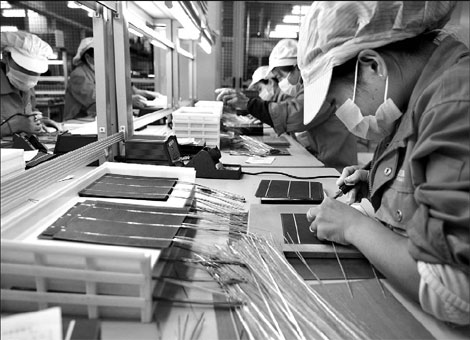Polysilicon prices look set for rebound
|
Solar cells being assembled in Ninghai, Zhejiang province. The average world spot price for polysilicon, an essential material for solar cells, is expected to rise by 10 percent in the third quarter. Jia Ce / for China Daily |
Panel makers seek new strategies to deal with volatile cost of key input
BEIJING - The price of polysilicon, an essential material for solar cells, has begun to rebound after slumping during the global downturn, driving module makers to seek new strategies to guard against volatile prices.
The average world spot price for polysilicon is expected to rise by 10 percent in the third quarter, according to Guosen Securities.
That expected gain contrasts sharply with the trend of prices so far this year.
According to Bloomberg New Energy Finance, the spot price slid from $70 a kilogram in the first quarter to $50 a kg in the second.
Polysilicon has been the choke point of the solar cell industry chain.
Over the past six months, the drop in polysilicon prices has translated into lower prices for downstream products.
A shortage of polysilicon emerged in 2004 when the global solar industry started to take off and the number of panel makers soared.
Rising demand and shortages at one point drove the spot price of polysilicon above $500 a kg, attracting many new producers.
Volatile polysilicon prices led many module makers earlier this year to terminate long-term contracts to buy the material, which is sold either as a raw material or as wafers.
Even as the spot price for polysilicon slid in the first half, though, polysilicon suppliers were reluctant to lower contract prices.
As a result, many of their customers began to break long-term contracts.
China-based Suntech Power Holdings Co Ltd, the world's largest producer of silicon-based solar panels, terminated a 10-year solar wafer purchase contract with US-based MEMC Electronic Materials Inc in June.
Suntech Chairman Shi Zhengrong said at the time that the move will help the company "benefit from the continuing drop in silicon and wafer prices".
The company said at the time that ending the contract would save Suntech, based in Wuxi, Jiangsu province, about $400 million over the next five years.
The new arrangement was intended to allow Suntech to save money by maximizing its internal wafer output.
GCL-Poly Energy Holdings Ltd is one of the few integrated polysilicon supply companies and became the world's leading wafer producer in 2010.
The integration has allowed GCL-Poly to control the supply of materials while lowering its costs for wafer production.
Unlike its competitors, Suntech had been focusing on the downstream business, module production, which dragged down its profitability due to dramatic changes in polysilicon prices, according to industry analyst Shen Hongwen at China Investment Consulting.
Suntech acquired China-based silicon wafer producer Zhenjiang Rongde New Energy Technology Co for $130 million earlier this year.
The acquisition of a wafer production facility will drive down costs and improve margins in 2011, Shi said.
China Daily
(China Daily 07/08/2011 page16)



















